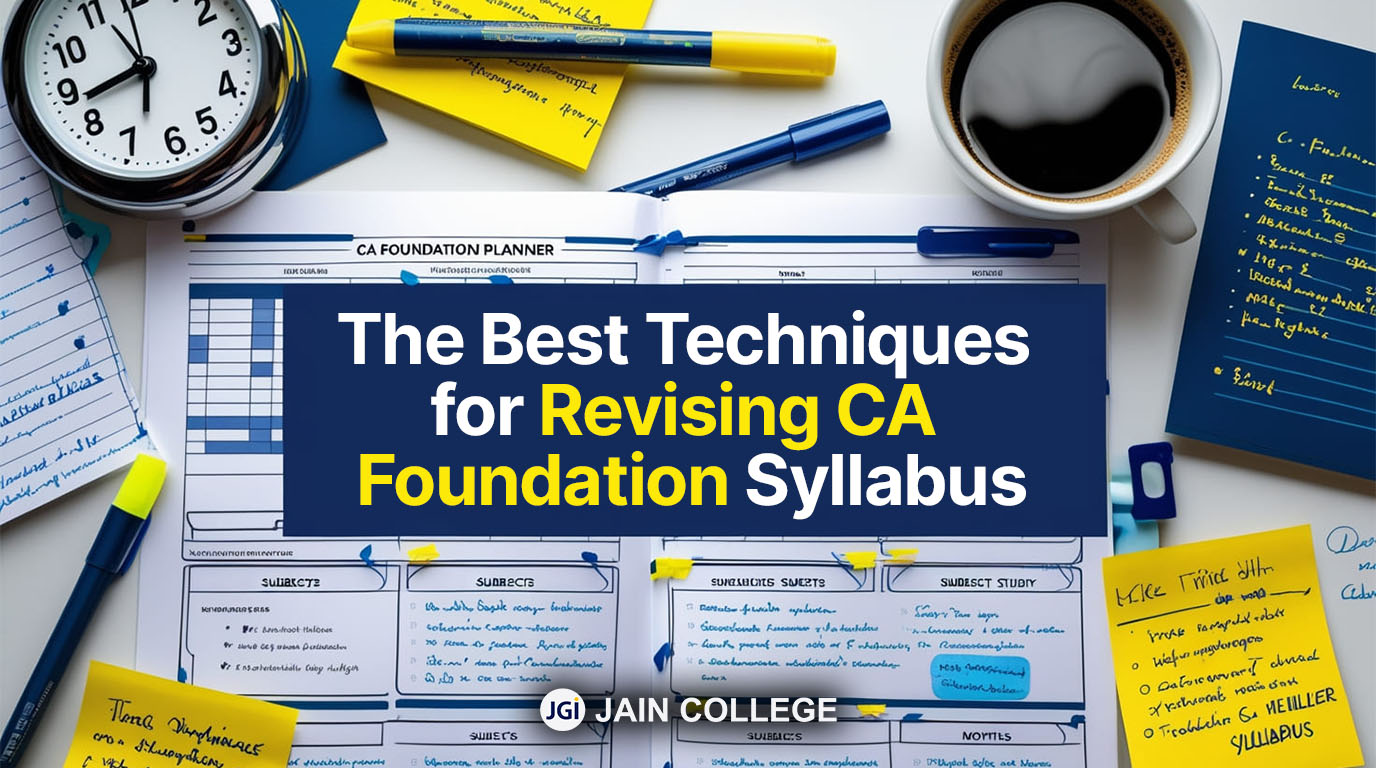
The syllabus for CA Foundation is extensive and you have limited time to prepare for the exam. For a 12th-grade student aspiring to clear this crucial exam, it is crucial to have an effective revision strategy. CA Foundation has four papers –
Paper 1: Accounting
Paper 2: Business Laws
Paper 3: Quantitative Aptitude
Paper 4: Business Economics
The first two papers are subjective, while the last two are objective. Each paper is worth 100 marks, for a total of 400 marks. To ensure success, it is important to revise strategically. Here are the best techniques to help you master the CA Foundation syllabus effectively.
In your regular study plan, right from the beginning, assign some time for revision. You can allocate smaller time slots for revision in the beginning, and as you cover more syllabus, start expanding on the time allocated for revision. Allocate specific time slots for each subject, ensuring balanced coverage. Prioritise topics based on difficulty level and past exam trends. A well-organised plan helps prevent last-minute stress and improves efficiency.
Active recall in revision is a study technique where you actively try to retrieve information from your memory by testing yourself, without relying on prompts or directly looking at the material to strengthen neural connections and improve long-term retention. In this technique, you mentally quiz yourself on the subject matter you're revising. Use flashcards, mind maps, or self-quizzing to enhance memory retention. Combine this with spaced repetition by reviewing topics at regular intervals to reinforce concepts.
Make solving previous years’ question papers and taking mock tests an active part of your revision. This will help you familiarise yourself with the exam pattern, improve time management, and identify weak areas. Simulate exam conditions while attempting these tests to build confidence and avoid any nervousness or anxiety about the actual exam.
While you have to memorise formulas and entries, first, try to gain conceptual clarity behind them. The CA exams test analytical skills, so understanding the ‘why’ behind concepts is essential. There are ample resources online and offline that provide detailed and comprehensive explanations on various topics. You can have your doubts cleared by tutors or peers, watch online lectures, or use reference books when you are stuck.
Prepare concise summary notes for quick revision as you study. Highlight key formulas, legal provisions, and important concepts. Use charts, diagrams, and flowcharts to simplify complex topics. Make flashcards on important terms. As you progress with the syllabus, you can continue updating your notes, which will help with making last-minute revisions more effective and less overwhelming.
CA Foundation subjects such as Accounting and Mathematics require regular problem-solving. As much time as you spend learning theories, you must spend solving mathematical problems and accounting entries. Reattempt questions where you made mistakes to avoid repeating them in the exam.
There are many online discussion forums for CA aspirants where students post their problems or discuss topics and solutions. Even in college and coaching classes, you will meet other students appearing for the tests. Connect with them and join discussions to clear doubts, find new resources for studying or solving problems and clarify exam-related queries. Explaining concepts to peers strengthens your grasp of the subject.
The CA Foundation exam requires consistent study and regular practice. Prepare a study plan to keep you focused on your goals for the day but not lead to an eventual burnout. Use techniques like the Pomodoro method where you study for 25-50 minutes and take short breaks to stay focused. Rather than keeping a break as a coveted prize for succeeding, give yourself regular time-offs to refresh your mind and recapitulate what you have learned so far with an easy mind.
A positive mindset plays a significant role in exam preparation. Engage in physical activities, practice meditation, and ensure adequate sleep. A well-rested mind retains information better and improves concentration. It is common for students to give up all their usual non-academic pursuits such as music, arts or sports while they are preparing for a crucial exam. Rather than give it up completely, continue staying active in your interests, just give it less time than you usually do.
As the exam approaches, avoid picking up new topics to study or looking at new information on the same topic that goes beyond the purview of the syllabus. Keep it simple and focus on revising what you have already learned. Use your summary notes, practice quick quizzes, and go through past mistakes.
You must adopt a strategic approach towards revision for the CA Foundation exam. Stick to a well-planned schedule, use active recall techniques, practice consistently, and maintain a balanced routine to enhance your chances of success. With discipline and focus in your preparation, you can approach the exam with confidence.
JAIN PU College has a strong integrated CA programme that they offer in association with ALLEN Institute. Visit the website to learn more about the course and how it will add value to your learning.
Best of luck!

JAIN PU College, a part of the renowned JGI Group, is committed to empowering students with quality education.
Beyond academics, the college ensures its online content reflects the same standard of excellence. Every blog and article is meticulously vetted and proofread by subject matter experts to ensure accuracy, relevance, and clarity. From insightful educational topics to engaging discussions, JAIN PU College's content is crafted to inform, inspire, and add value to its readers, reflecting the institution's commitment to intellectual growth and innovation.
View all Blogs